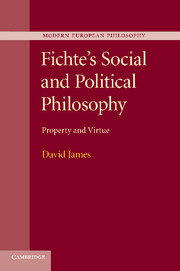Book contents
- Frontmatter
- Contents
- Acknowledgements
- List of abbreviations of Fichte's works
- Introduction
- 1 Fichte's theory of property
- 2 Applying the concept of right: Fichte and Babeuf
- 3 Fichte's reappraisal of Kant's theory of cosmopolitan right
- 4 The relation of right to morality in Fichte's Jena theory of the state and society
- 5 The role of virtue in the Addresses to the German Nation
- Bibliography
- Index
4 - The relation of right to morality in Fichte's Jena theory of the state and society
Published online by Cambridge University Press: 03 May 2011
- Frontmatter
- Contents
- Acknowledgements
- List of abbreviations of Fichte's works
- Introduction
- 1 Fichte's theory of property
- 2 Applying the concept of right: Fichte and Babeuf
- 3 Fichte's reappraisal of Kant's theory of cosmopolitan right
- 4 The relation of right to morality in Fichte's Jena theory of the state and society
- 5 The role of virtue in the Addresses to the German Nation
- Bibliography
- Index
Summary
A distinctive feature of Fichte's ethical and political philosophy from the period of his professorship at the University of Jena between 1794 and 1799 is the way in which he separates the juridical and political sphere of right from morality. In his 1796/97 Foundations of Natural Right, Fichte claims to have effected this separation by deducing the concept of right as a condition of self-consciousness, thereby making it independent of the moral law or law of ethics. The originality of this approach can be brought out by comparing Fichte's position to that of some of Kant's other followers, who did derive the concept of right from the moral law. This was done by making the moral law into the rule of that which is morally commanded or forbidden, and by then identifying right with the sphere of possible actions that one has a right to perform because they are morally indifferent, in the sense that the moral law neither directly commands nor forbids them. This leaves each individual free to decide whether or not to perform these actions, none of which threatens to transgress the moral law. Right is here characterized in terms of a permissive law, that is, a law that states which actions are permissible within the limits set by the moral law. Fichte himself adopted such a conception of right in his 1793 Contribution towards Correcting the Public's Judgement of the French Revolution, in which he characterizes a right as anything that the moral law does not expressly forbid one to do, and claims that whenever the moral law is silent, an individual's actions are left to the promptings of his own arbitrary will (Willkühr).
- Type
- Chapter
- Information
- Fichte's Social and Political PhilosophyProperty and Virtue, pp. 112 - 161Publisher: Cambridge University PressPrint publication year: 2011
- 1
- Cited by

